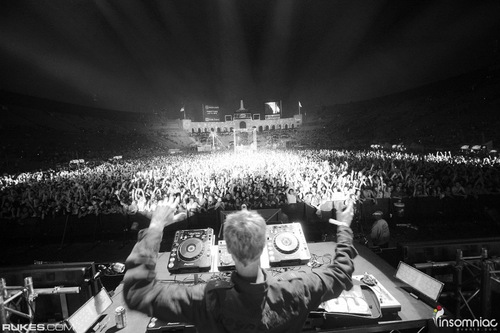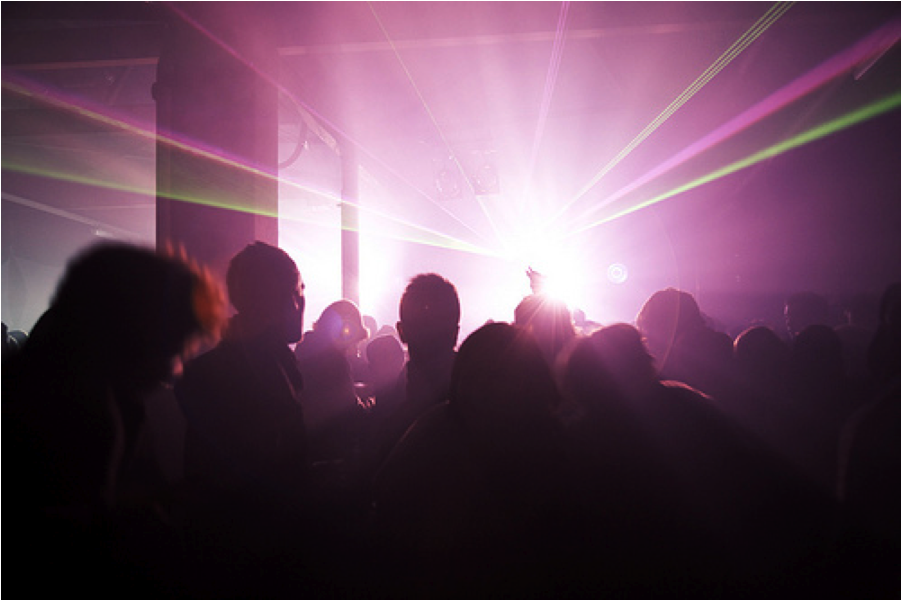 Electric Daisy Carnival saw a total of 200,000 patrons over the July weekend.
Electric Daisy Carnival saw a total of 200,000 patrons over the July weekend.
"A brief history of electronic music's place in popular culture"
How did a style of music, once exclusive to the seedy underbellies of international metropolises and pale audiophiles futzing with their university's hardware, evolve into a Bill Board-topping, Grammy-nominated, Bieber-endorsed genre? After decades of sub-culture prominence, electronic music has emerged as a force within the mainstream. Thanks to globalization, the beeps and clicks of yesterday are now the tunes stuck in the heads of fifth grader's, young adults, and baby boomers alike.
So what exactly is everybody listening to? They are listening to music generated electromechanically or produced using electronic technology. Trust me, they are.
It began in the early 20th century, with technologies from American, then Russian, then Italian, then German inventors and engineers. Then, after further advancements from Americans, Germans, French, and Japanese, we arrived in the 60's, the so-called, "fertile years," of electronic music.
Though the RCA Mark II Sound Synthesizer installed in the Columbia- Princeton Electronic Music Center in 1957 is considered the first ever programmable synth, it was Robert Moog that released the first ever commercially available modern synthesizer that really fired-up musicians.
The Monkees were the first popular act to make a purchase. Months later, the Rolling Stone's released, "2000 Light Years From Home," followed by the 1967 hit from The Doors, "Strange Days."
-Robert Moog gives Paul McCartney the grand tour
The Beatles also hopped on the Moog train, but it was the largely unsuccessful progressive outfits, like Beaver and Krause or Tonto's Expanding Head Band, that pushed the boundaries of these new electronic possibilities.
Let's fast-forward past the 70's, past Genesis, Brian Eno, The Human League, and Devo, and into the 80's when the first ever drum machines were released and popularized. The Roland TR-808, for instance, saw widespread success after its use on Marvin Gaye's, "Sexual Healing," in 1982.
Now equipped with drums and synthesizers, the electronic music genre took its plunge into the subculture by late 1980. Disco, defined by the cocaine-dusted corners of infamous venues like Club 54, was one of the first styles to use the "4 on the floor," beat so popular today. This developed in Chicago, and later in the UK, into what is now known as House music, defined by its minimal progressions, lengthy build-ups, and raucously illegal warehouse parties. Producers huddled around turn tables and sub woofers as the decade went on. Genre's like Garage, Jungle, Breakbeat, Drum & Bass, and, most significantly, Dubstep, also emerged from this considerably shady taste in music.

- Just your average rave
This underground rave scene continued through the 90's and early 2000's with only brief hiccups into the mainstream, from artists like Daft Punk, The Prodigy, and Moby.
Now, in 2011, over 50 years after the release of the first electronic instrument, we hear the styles once exclusive to the subversive employed incessantly over every major radio station across the continent.
As I write this, the top two spots on the American Billboard are filled with the electronic dance music of LMFAO and Calvin Harris. Uk dubstep relic, Benga, reached the number one spot earlier this year with his collaboration with Katy B. American dubstep producer, Skrillex, has just been nominated for a Grammy! Pop artists are now flocking to this new breed of producer to claim their slice of the cake. Rihanna teamed up with Jamie xx. Britney Spears hired Rusko. And it doesn't stop there.
Festivals known to feature this once sparsely loved genre are now expanding and even breaching capacity. Canada's largest electronic music festival, Shambhala, sold out for the very first time last year. The almost mythical Burning Man Festival is rumoured to be in its final year due to the obscene number of people that made the pilgrimage last year. Montreal's own Igloofest once saw a humble 4,000 attendees. Now, only 6 years later, over 60,000 ravers will flock to the Old Port Quarry to frolic in the sub-zero temperatures and even cooler Dub, Dance-hall, Electro, Minimal, House, and Future- Garage sounds.
- Igloofest 2011
Why?!
The metaphorical answer would be the Ipod. That nifty piece of tech-and-plastic serves as a fine symbol for the dawn of media file sharing. Kids young and old could for the very first time handpick their music library. It became a form of self-expression. It was your music.
This, combined with the ability to download music cheaply and easily, lead to a demand for more music. Luckily, with production software more affordable than ever, every eager musician with a few dollars, or a knack for pirating programs, could hide in their basement and supply this demand with their modern synthesizers and drum machines.
And they did.
Sure, acoustic outfits still reign supreme in the music industry, but since artists have had the ability to create, record, and distribute electronic music so effortlessly, the prominence of the genre as a whole has spiked significantly.
So does that mean electronic music isn't cool anymore? Is it too mainstream? Of course not! Its progress! Its evolution! Its thrilling! The future of music, electronic or not, has never been brighter. Sure, genre's will ebb and flow, but all this proves is the remarkable elasticity of one of man's greatest passions. Though, I must admit, if I hear, "Everyday I'm shufflin'," one more time, I'm going to shove that shot inevitably dangling before their wet lips straight down their throat, glass included.

-Chart toppers, LMFAO
Bless-
Samuel Scott Rutledge

Iunderstand what you are saying and I agree with you